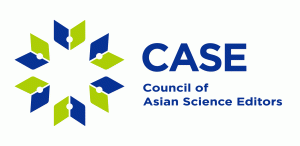Article Review
Science Editing, the official journal of the Korean Council of Science Editors (KCSE) and Council of Asian Science Editors (CASE), is now both indexed in Scopus and ESCI (Emerging Sources Citation Index). Science Editing is also listed in the DOAJ (Directory of Open Access Journals) since 2016. Editors, publishers, authors and reviewers all over the world are welcomed to contribute their valuable manuscripts to Science Editing.
- Article Review 1
Language policy and the disengagement of the international academic elite
John Harbord
This paper explores the phenomena of academic multiliteracy (the habit of writing academically in more than one language) and of L2 monoliteracy (that of only writing academically in a language that is not one’s own) and their impact on policy. Based on interviews and surveys conducted with 33 multiliterate and 15 L2 monoliterate scholars connected to one university in Central Europe between 2010 and 2014, difficulties ambitious young scholars, whose first language is not English, encounter are addressed. Suggestions for the young scholars, university and state policies are made to overcome this issue.
- Article Review 2
Authors’ perspectives on academic publishing: initial observations from a large-scale global survey
Basil D’Souza et al.
To understand the viewpoints of authors on various aspects of academic publishing and the challenges they face, a large-scale survey entitled “Author perspectives on the academic publishing process” was developed in 2016. Based on the interim results drawn from 5,293 survey responses, important findings include: (1) the majority of the authors found manuscript preparation to be the most challenging task in the publication process, (2) the impact factor of a journal was reported to be the most important consideration for journal selection, (3) most authors found journal guidelines to be incomplete, (4) major gaps existed in author-journal communication, (5) although awareness of ethics was high, awareness of good publication practice standards was low, and (6) more than half of the participants suggested improvement in publication processing time. These findings indicate the necessity of making the journal publication process more author-centered and smoothing the way for authors to get published.
- Article Review 3
Comparison of the patterns of duplicate articles between KoreaMed and PubMed journals published from 2004 to 2009 according to the categories of duplicate publications
Soo Young Kim et al.
This study compared the patterns of duplicate articles between KoreaMed and PubMed journals based on a division of duplicate publications into the 4 categories of ‘copy,’ ‘salami’ (fragmentation), ‘imalas’ (disaggregation), and ‘others,’ as well as in terms of the 11 subcategories suggested by Bae et al., which further elaborate on those 4 main categories. We hypothesized that these 2 groups of articles would show different patterns of duplication. The use of these 11 subcategories will help journal editors to develop an appropriate framework for considering a variety of duplication types.
- Article Review 1
Update: Bibliometric analysis of publications from North Korea indexed in the Web of Science Core Collection from 1978 to July 2018
Geum Hee Jeong et al.
This study presents an update of a previous study, ‘Bibliometric analysis of publications from North Korea indexed in the Web of Science Core Collection from 1988 to 2016,’ which was published in Science Editing volume 4, issue 1. The present study analyzed the same bibliometric characteristics of publications from North Korea indexed in the Web of Science Core Collection from 1978 to 2018. The results were almost the same as reported in the previous article, except for a much higher number of publications. The above results indicate that the North Korean government has asked researchers to publish their works in international journals; therefore, it has allowed them to access the internet. Based on the trends we identified, we anticipate that there will be a continuous increase in publications from North Korea in international journals indexed in the Web of Science Core Collection.
- Article Review 2
Comparative analysis of manuscript management systems for scholarly publishing
Soon Kim et al.
To improve scholarly communications with scientists throughout the world, an international-level manuscript management system is indispensable. We analyzed the manuscript management systems currently in use in Korea and suggested ways to improve these domestic systems through benchmarking with representative overseas systems. Based on this analysis, we identified the essential elements necessary to meet international standards. The representative international systems provide an intuitive interface and an efficient communication channel for authors, editors, and reviewers, enabling them to save time. Studies of these manuscript management systems, which are essential for the internationalization of domestic journals, can be utilized as primary materials to improve the level of Korean academic journals in response to the rapid changes in modern scholarly communication.
